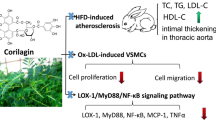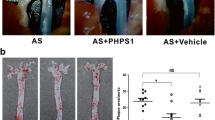Abstract
Background
Atherosclerosis is characterized by extensive thickening of the arterial intima partially resulting from deposition of collagen by vascular smooth muscle cells (SMCs). Polyunsaturated fatty acids stimulate collagen formation through NF-κB activation.
Aim of the study
The present study aimed to explore the effect of conjugated linoleic acids (CLAs) which are known to inhibit NF-κB activation on collagen formation by SMCs.
Methods
Vascular SMCs were cultured with 50 µmol/l of CLA isomers (c9t11-CLA, t10c12-CLA) or linoleic acid (LA) and analysed for collagen formation and NF-κB p50 transactivation.
Results
Treatment with CLA isomers but not LA significantly reduced PDGF-stimulated [3H] proline incorporation into cell layer protein of SMCs without altering cell proliferation. Simultaneous treatment with the PPARγ inhibitor T0070907 abrogated this effect. Treatment of SMCs with c9t11-CLA and t10c12-CLA significantly reduced PDGF-induced NF-κB p50 activation.
Conclusions
CLA isomers inhibit PDGF-stimulated collagen production by vascular SMCs, which is considered to be a hallmark of atherosclerosis, in a PPARγ-dependent manner. Whether inhibition of the NF-κB-pathway is of significance for the reduction of collagen formation by CLA isomers needs further investigation.



Similar content being viewed by others
References
Bowie A, O’Neill LA (2000) Oxidative stress and nuclear factor-κB activation: a reassessment of the evidence in the light of recent discoveries. Biochem Pharmacol 59:13–23
Burke JM, Ross R (1979) Synthesis of connective tissue macromolecules by smooth muscle. Int Rev Connect Tissue Res 8:119–157
Burgess HA, Daugherty LE, Thatcher TH, Lakatos HF, Ray DM, Redonnet M, Phipps RP, Sime PJ (2005) PPARγ agonists inhibit TGF-β induced pulmonary myofibroblast differentiation and collagen production: implications for therapy of lung fibrosis. Am J Physiol Lung Cell Mol Physiol 288:L1146–L1153
Büttner C, Skupin A, Rieber EP (2004) Transcriptional activation of the type I collagen genes COL1A1 and COL1A2 in fibroblasts by interleukin-4: analysis of the functional collagen promoter sequences. J Cell Physiol 198:248–258
Chen A, Zhang L, Xu J, Tang J (2002) The antioxidant (-)-epigallocatechin-3-gallate inhibits activated hepatic stellate cell growth and suppresses acetaldehyde-induced gene expression. Biochem J 368:695–704
Chen C-N, Li Y-SJ, Yeh Y-T, Lee P-L, Usami S, Chien S, Chiu J-J (2006) Synergistic roles of platelet-derived growth factor-BB and interleukin-1β in phenotypic modulation of human aortic smooth muscle cells. PNAS 103:2665–2670
Cheng WL, Lii CK, Chen HW, Lin TH, Liu KL (2004) Contribution of conjugated linoleic acid to the suppression of inflammatory responses through the regulation of the NF-κB pathway. J Agric Food Chem 52:71–78
de Winther MP, Kanters E, Kraal G, Hofker MH (2005) Nuclear factor κB signaling in atherogenesis. Arterioscler Thromb Vasc Biol 25:904–914
Dubey R, Jackson EK, Gillespie DG, Zacharia LC, Imthurn B, Keller PJ (2000) Clinically used estrogens differentially inhibit human aortic smooth muscle cell growth and mitogen-activated protein kinase activity. Arterioscler Thromb Vasc Biol 20:964–972
Eder K, Slomma N, Becker K (2002) Trans-10, cis-12 conjugated linoleic acid suppresses the desaturation of linoleic and α-linolenic acids in HepG2 cells. J Nutr 132:1115–1121
Fu M, Zhang J, Zhu X, Myles DE, Willson TM, Liu X, Chen YE (2001) Peroxisome proliferator-activated receptor γ inhibits transforming growth factor β-induced connective tissue growth factor expression in human aortic smooth muscle cells by interfering with Smad3. J Biol Chem 276:45888–45894
Hankenson KD, Watkins BA, Schoenlein IA, Allen KG, Turek JJ (2000) Omega-3 fatty acids enhance ligament fibroblast collagen formation in association with changes in interleukin-6 production. Proc Soc Exp Biol Med 223:88–95
Hwang DM, Kundu JK, Shin JW, Lee JC, Lee HJ, Surh YJ (2007) Cis-9,trans-11-Conjugated linoleic acid down-regulates phorbol ester-induced NF-κB activation and subsequent COX-2 expression in hairless mouse skin by targeting IκB kinase and PI3K-Akt. Carcinogenesis 28:363–371
Jia Y, Turek J (2005) Altered NF-nB gene expression and collagen formation induced by polyunsaturated fatty acids. J Nutr Biochem 16:500–506
Jimi S, Saku K, Uesugi N, Sakata N, Takebayashi S (1995) Oxidized low density lipoprotein stimulates collagen production in cultured arterial smooth muscle cells. Atherosclerosis 116:15–26
Katsuda S, Kaji T (2003) Atherosclerosis and extracellular matrix. J Atheroscler Thromb 10:267–274
Kim JH, Hubbard NE, Ziboh V, Erickson KL (2005) Attenuation of breast tumor cell growth by conjugated linoleic acid via inhibition of 5-lipoxygenase activating protein. Biochim Biophys Acta 1736:244–250
Kritchevsky D, Tepper SA, Wright S, Tso P, Czarnecki SK (2000) Influence of conjugated linoleic acid (CLA) on establishment and progression of atherosclerosis in rabbits. J Am Coll Nutr 19:472S–477S
Ku CH, Johnson PH, Batten P, Sarathchandra P, Chambers RC, Taylor PM, Yacoub MH, Chester AH (2006) Collagen synthesis by mesenchymal stem cells and aortic valve interstitial cells in response to mechanical stretch. Cardiovasc Res 71:548–556
LaPointe MC, Mendez M, Leung A, Tao Z, Yang XP (2004) Inhibition of cyclooxygenase-2 improves cardiac function after myocardial infarction in the mouse. Am J Physiol 286:H1416–H1424
Levick SP, Loch DC, Taylor SM, Janicki JS (2007) Arachidonic acid metabolism as a potential mediator of cardiac fibrosis associated with inflammation. J Immunol 178:641–646
Li M, Pascual G, Glass CK (2000) Peroxisome proliferator-activated receptor γ-dependent repression of the inducible nitric oxide synthase gene. Mol Cell Biol 20:4699–4707
Li G, Dong B, Butz DE, Park Y, Pariza MW, Cook ME (2006) NF-kappaB independent inhibition of lipopolysaccharide-induced cyclooxygenase by a conjugated linoleic acid cognate, conjugated nonadecadienoic acid. Biochim Biophys Acta 1761:969–972
Loscher CE, Draper E, Leavy O, Kelleher D, Mills KH, Roche HM (2005) Conjugated linoleic acid suppresses NF-kappa B activation and IL-12 production in dendritic cells through ERK-mediated IL-10 induction. J Immunol 175:4990–4998
Muz MH, Deveci F, Bulut Y, Ilhan N, Yekeler H, Turgut T (2006) The effects of low dose leukotriene receptor antagonist therapy on airway remodelling and cysteinyl leukotrien expression in a mouse asthma model. Exp Mol Med 38:109–118
Nieto N, Friedman SL, Greenwel P, Cederbaum AI (1999) CYP2E1-mediated oxidative stress induces collagen type I expression in rat hepatic stellate cells. Hepatology 30:987–996
Nieto N, Greenwel P, Friedman SL, Zhang F, Dannenberg AJ, Cederbaum AI (2000) Ethanol and arachidonic acid increase α 2(I) collagen expression in rat hepatic stellate cells overexpressing cytochrome P450 2E1. Role of H2O2 and cyclooxygenase-2. J Biol Chem 275:20136–20145
Ringseis R, Müller A, Herter C, Gahler S, Steinhart H, Eder K (2006) CLA isomers inhibit TNFα-induced eicosanoid release from human vascular smooth muscle cells via a PPARγ ligand-like action. Biochim Biophys Acta 1760:290–300
Ringseis R, Gahler S, Herter C, Eder K (2006) Conjugated linoleic acids exert similar actions on prostanoid release from aortic and coronary artery smooth muscle cells. Int J Vitam Nutr Res 76:281–289
Schleser S, Ringseis R, Eder K (2006) Conjugated linoleic acids have no effect on TNFα-induced adhesion molecule expression, U937 monocyte adhesion, and chemokine release in human aortic endothelial cells. Atherosclerosis 186:337–344
Shen J, Halenda SP, Sturek M, Wilden PA (2005) Novel mitogenic effect of adenosine on coronary artery smooth muscle cells: role for the A 1 adenosine receptor. Circ Res 96:982–990
Steinhart H, Rickert R, Winkler K (2003) Identification and analysis of conjugated linoleic acid isomers (CLA). Eur J Med Res 8:370–372
Straus DS, Pascual G, Li M, Welch JS, Ricote M, Hsiang CH, Sengchanthalangsy LL, Ghosh G, Glass CK (2000) 15-deoxy-delta 12,14-prostaglandin J2 inhibits multiple steps in the NF-kappa B signaling pathway. Proc Natl Acad Sci USA 97:4844–4849
Suganami T, Mori K, Tanaka I, Mukoyama M, Sugawara A, Makino H, Muro S, Yahat K, Ohuchida S, Maruyama T, Narumiya S, Nakao K (2003) Role of prostaglandin E receptor EP1 subtype in the development of renal injury in genetically hypertensive rats. Hypertension 42:1183–1190
Toomey S, Roche HM, Fitzgerald D, Belton O (2003) Regression of pre-established atherosclerosis in the apoE-/- mouse by conjugated linoleic acid. Biochem Soc Trans 31:1075–1079
Toomey S, Harhen B, Roche HM, Fitzgerald D, Belton O (2006) Profound resolution of early atherosclerosis with conjugated linoleic acid. Atherosclerosis 187:40–49
Torres-Duarte AP, Vanderhoek JY (2003) Conjugated linoleic acid exhibits stimulatory and inhibitory effects on prostanoid production in human endothelial cells and platelets. Biochim Biophys Acta 1640:169–176
Vistica DT, Skehan P, Scudiero D, Monks A, Pittman A, Boyd MR (1991) Tetrazolium-based assays for cellular viability: a critical examination of selected parameters affecting formazan production. Cancer Res 51:2515–2520
Weldon S, Mitchell S, Kelleher D, Gibney MJ, Roche HM (2004) Conjugated linoleic acid and atherosclerosis: no effect on molecular markers of cholesterol homeostasis in THP-1 macrophages. Atherosclerosis 174:261–273
Yu Y, Correll PH, Vanden Heuvel JP (2002) Conjugated linoleic acid decreases production of pro-inflammatory products in macrophages: evidence of PPARγ-dependent mechanism. Biochim Biophys Acta 1581:89–99
Zacharia LC, Jackson EK, Gillespie DG, Dubey RK (2001) Increased 2-methoxyextradiol production in human coronary versus aortic vascular cells. Hypertension 37:658–662
Zheng S, Chen A (2006) Curcumin suppresses the expression of extracellular matrix genes in activated hepatic stellate cells by inhibiting gene expression of connective tissue growth factor. Am J Physiol Gastrointest Liver Physiol 290:G883–G893
Author information
Authors and Affiliations
Corresponding author
Rights and permissions
About this article
Cite this article
Ringseis, R., Gahler, S. & Eder, K. Conjugated linoleic acid isomers inhibit platelet-derived growth factor-induced NF-κB transactivation and collagen formation in human vascular smooth muscle cells. Eur J Nutr 47, 59–67 (2008). https://doi.org/10.1007/s00394-008-0697-8
Received:
Accepted:
Published:
Issue Date:
DOI: https://doi.org/10.1007/s00394-008-0697-8




